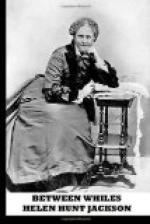As they sat at supper, Farmer Weitbreck and his wife plied Wilhelm with questions about their old friends in Mayence. He was evidently familiar with all the localities and names which they mentioned. His replies, however, were given as far as possible in monosyllables, and he spoke no word voluntarily. Sitting with his head bent slightly forward, his eyes fixed on the floor, he had the expression of one lost in thoughts of the gloomiest kind.
“Make yourself to be more happy, mein lad,” said the farmer, as he bade him good-night and clapped him on the shoulder. “You haf come to house vere is German be speaked, and is Germany in hearts; dat vill be to you as friends.”
A strange look of even keener pain passed over the young man’s face, and he left the room hastily, without a word of good-night.
“He’s a surly brute!” cried John; “nice company he’ll be in the field! I believe I’d sooner have nobody!”
“I think he has seen some dreadful trouble,” said Carlen. “I wish we could do something for him; perhaps his friends are all dead. I think that must be it, don’t you think so, muetter?”
Frau Weitbreck was incarnate silence and reticence. These traits were native in her, and had been intensified to an abnormal extent by thirty years of life with a husband whose temper and peculiarities were such as to make silence and reticence the sole conditions of peace and comfort. To so great a degree had this second nature of the good frau been developed, that she herself did not now know that it was a second nature; therefore it stood her in hand as well as if she had been originally born to it, and it would have been hard to find in Lancaster County a more placid and contented wife than she. She never dreamed that her custom of silent acquiescence in all that Gustavus said—of waiting in all cases, small and great, for his decision—had in the outset been born of radical and uncomfortable disagreements with him. And as for Gustavus himself, if anybody had hinted to him that his frau could think, or ever had thought, any word or deed of his other than right, he would have chuckled complacently at that person’s blind ignorance of the truth.
“Mein frau, she is goot,” he said; “goot frau, goot muetter. American fraus not goot so she; all de time talk and no vork. American fraus, American mans, are sheep in dere house.”
But in regard to this young stranger, Frau Weitbreck seemed strangely stirred from her usual phlegmatic silence. Carlen’s appeal to her had barely been spoken, when, rising in her place at the head of the table, the old woman said solemnly, in German,—
“Yes, Liebchen, he goes with the eyes like eyes of a man that saw always the dead. It must be as you say, that all whom he loves are in the grave. Poor boy! poor boy! it is now that one must be to him mother and father and brother.”
“And sister too,” said Carlen, warmly. “I will be his sister.”




